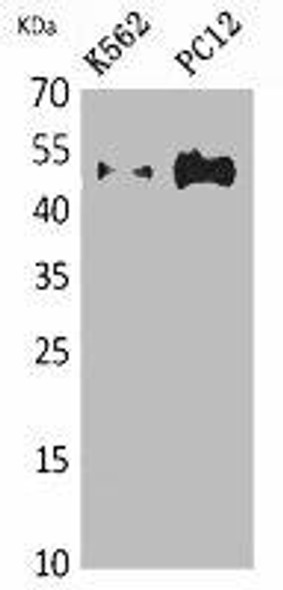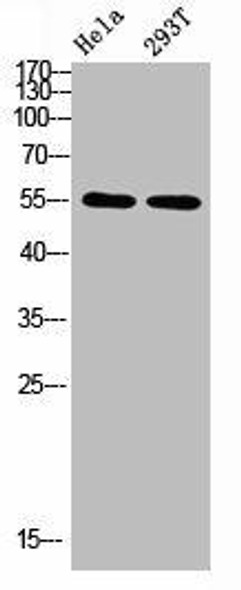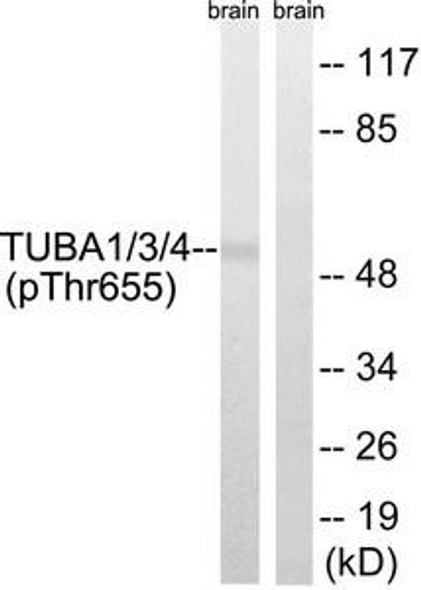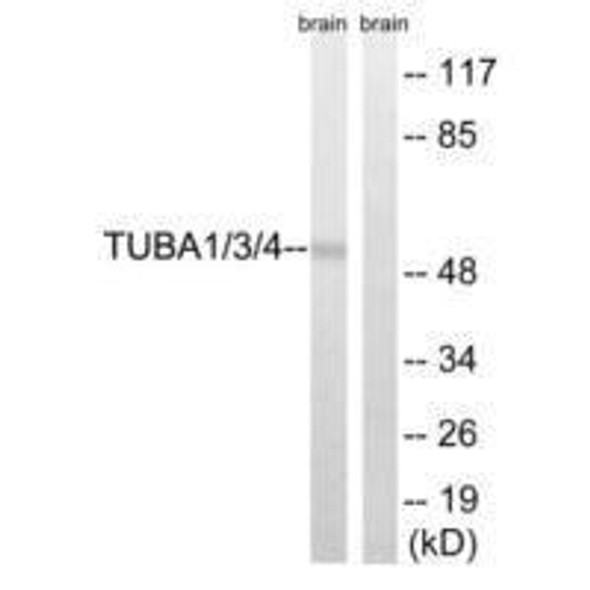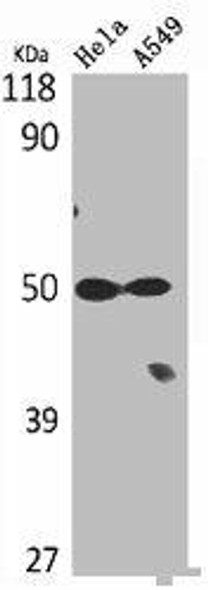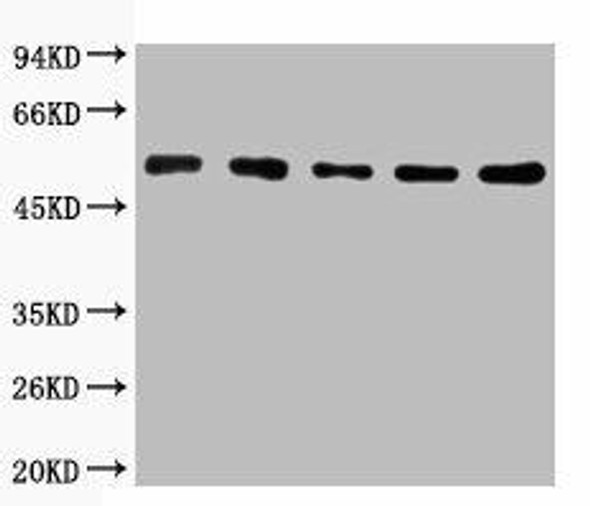Description
Acetyl-TUBA1A/TUBA1B/TUBA1C (K112) Antibody (PACO00072)
The Acetyl-TUBA1A/TUBA1B/TUBA1C (K112) Antibody (PACO00072) is a valuable tool for researchers studying the acetylation of tubulin isoforms TUBA1A, TUBA1B, and TUBA1C. This polyclonal antibody, developed and tested by Assay Genie, is raised in rabbits and highly specific for human samples, making it ideal for a wide range of applications in cell biology and molecular biology studies.Tubulin acetylation plays a crucial role in cell division, cell motility, and intracellular transport processes. By targeting the acetylation site K112 on these tubulin isoforms, researchers can gain insights into the regulation and function of microtubules in various cellular processes.
This antibody has been validated for use in Western blot applications, allowing for the detection and analysis of acetylated TUBA isoforms in different cell types and tissues.The Acetyl-TUBA1A/TUBA1B/TUBA1C (K112) Antibody is a valuable tool for investigating the role of tubulin acetylation in diseases such as cancer, neurodegenerative disorders, and developmental abnormalities. Understanding the mechanisms underlying tubulin acetylation can provide valuable insights into potential therapeutic targets and treatment strategies for these conditions. With its high specificity and sensitivity, this antibody is a valuable asset for researchers working in the fields of
| Antibody Name: | Acetyl-TUBA1A/TUBA1B/TUBA1C (K112) Antibody |
| Antibody SKU: | PACO00072 |
| Size: | 50ug |
| Host Species: | Rabbit |
| Tested Applications: | ELISA, WB |
| Recommended Dilutions: | WB:1:500-1:2000 |
| Species Reactivity: | Human, Mouse, Rat |
| Immunogen: | synthesized peptide derived from human Tubulin alpha around the acetylation site of K112. |
| Form: | Liquid |
| Storage Buffer: | Liquid in PBS containing 50% glycerol, 0.5% BSA and 0.02% sodium azide. |
| Purification Method: | The antibody was affinity-purified from rabbit antiserum by affinity-chromatography using epitope-specific immunogen. |
| Clonality: | Polyclonal |
| Isotype: | IgG |
| Conjugate: | Non-conjugated |
| Synonyms: | TUBA1A; TUBA3; Tubulin alpha-1A chain; Alpha-tubulin 3; Tubulin B-alpha-1; Tubulin alpha-3 chain; TUBA1B; Tubulin alpha-1B chain; Alpha-tubulin ubiquitous |
| UniProt Protein Function: | TUBA1A: Tubulin is the major constituent of microtubules. It binds two moles of GTP, one at an exchangeable site on the beta chain and one at a non-exchangeable site on the alpha-chain. Dimer of alpha and beta chains. Expressed at a high level in fetal brain. Belongs to the tubulin family. |
| UniProt Protein Details: | Protein type:Motility/polarity/chemotaxis; Cytoskeletal Chromosomal Location of Human Ortholog: 12q13.12 Cellular Component: microtubule; recycling endosome; cytoplasmic microtubule; cytosol; nucleus Molecular Function:GTPase activity; protein domain specific binding; protein binding; GTP binding; structural constituent of cytoskeleton; structural molecule activity Biological Process: protein polymerization; 'de novo' posttranslational protein folding; cellular protein metabolic process; protein folding; cell division; organelle organization and biogenesis; cytoskeleton-dependent intracellular transport; mitotic cell cycle; G2/M transition of mitotic cell cycle; microtubule-based process Disease: Lissencephaly 3 |
| NCBI Summary: | Microtubules of the eukaryotic cytoskeleton perform essential and diverse functions and are composed of a heterodimer of alpha and beta tubulins. The genes encoding these microtubule constituents belong to the tubulin superfamily, which is composed of six distinct families. Genes from the alpha, beta and gamma tubulin families are found in all eukaryotes. The alpha and beta tubulins represent the major components of microtubules, while gamma tubulin plays a critical role in the nucleation of microtubule assembly. There are multiple alpha and beta tubulin genes, which are highly conserved among species. This gene encodes alpha tubulin and is highly similar to the mouse and rat Tuba1 genes. Northern blot studies have shown that the gene expression is predominantly found in morphologically differentiated neurologic cells. This gene is one of three alpha-tubulin genes in a cluster on chromosome 12q. Mutations in this gene cause lissencephaly type 3 (LIS3) - a neurological condition characterized by microcephaly, intellectual disability, and early-onset epilepsy caused by defective neuronal migration. Alternative splicing results in multiple transcript variants encoding distinct isoforms. [provided by RefSeq, Jul 2017] |
| UniProt Code: | Q71U36 |
| NCBI GenInfo Identifier: | 55977864 |
| NCBI Gene ID: | 7846 |
| NCBI Accession: | Q71U36.1 |
| UniProt Secondary Accession: | Q71U36,P68363, |
| UniProt Related Accession: | Q71U36 |
| Molecular Weight: | ~ 55kDa |
| NCBI Full Name: | Tubulin alpha-1A chain |
| NCBI Synonym Full Names: | tubulin alpha 1a |
| NCBI Official Symbol: | TUBA1A |
| NCBI Official Synonym Symbols: | LIS3; TUBA3; B-ALPHA-1 |
| NCBI Protein Information: | tubulin alpha-1A chain |
| UniProt Protein Name: | Tubulin alpha-1A chain |
| UniProt Synonym Protein Names: | Alpha-tubulin 3; Tubulin B-alpha-1; Tubulin alpha-3 chain |
| Protein Family: | Tubulin |
| UniProt Gene Name: | TUBA1A |
| UniProt Entry Name: | TBA1A_HUMAN |


